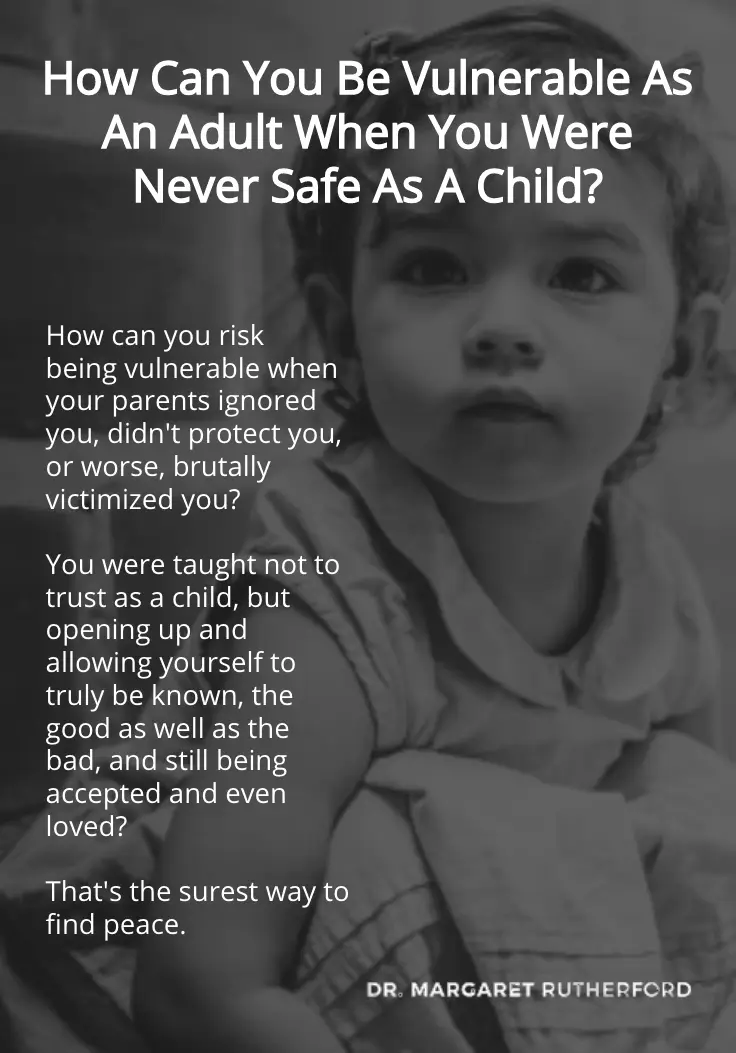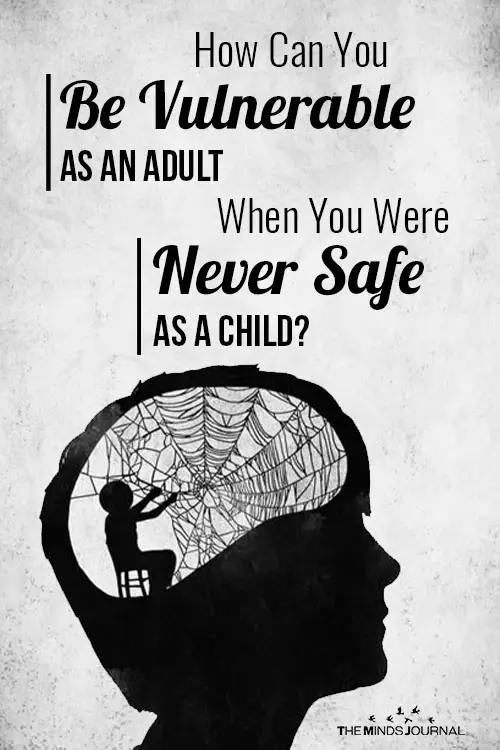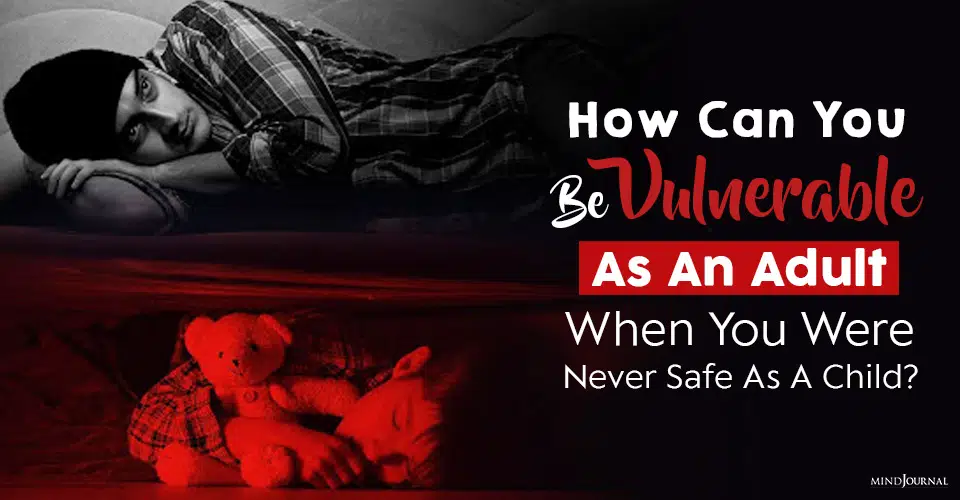Do you find being vulnerable very difficult as an adult, due to all the unsaid trauma, abuse, and victimization that you have gone through in your childhood?
It’s no wonder why being vulnerable is so hard for so many.
You learn to feel safe in the families you grow up in. If you were lucky you saw two fairly healthy parents who supported each other’s strengths, who had compassion for one another during their inevitable struggles, and who didn’t weaponize mistakes. You observed that when conflict did arise, compromises were reached, forgiveness was offered, and differing viewpoints were respected.
I hope this sounds like your childhood, but many of you certainly weren’t so lucky.
Related: 4 Ways That Childhood Trauma Impacts Adults
The unlucky children of abuse…
During my first rotation in graduate school, where I began getting hands-on experience as a psychologist, I was on a children’s unit of Terrell State Hospital, outside of Dallas; our patients were around twenty-five children between five and eleven-year-olds.
They were far from lucky.
They were kids. They laughed and played. They fought and cried. Many had suffered vicious abuse from their parents. Others had little control over their behavior due to severe mental illness. A few had both. So many times, their reactions to adults and to each other were stunted and skewed by the trauma already experienced in their short lives.
I was given the task of running a group for some of the youngest girls on healthy ways to feel about your body and yourself. They’d all been sexually abused. I listened as six-year-old Josie tried to explain the cruel things that had been done to her, and how sad she was. I watched as little hands were held out in comfort and understanding. It felt surreal, as they nodded their heads and talked about sexual behavior like much older children. I did my best to guide, very aware of the damage already caused to these young girls.
And then there was Max. Max was built like a tank and when he laughed, his whole body shook. When he ran, it was at warp speed. When he drew what he believed his body to look like, it was grossly malformed and resembled a monster much more than a human.
Max had also been abused in every way possible.
We took walks and he very slowly opened up. When he left the hospital, he gave me my first “present” from a patient. It was a painted plaster ladybug. I was heartbroken years later when it fell apart.
I’ve often wondered if Josie and Max would ever heal enough to be vulnerable in a relationship as adults.
How can you risk being vulnerable when your parents didn’t protect you, or worse, brutally victimized you? Or, in perhaps a less dramatic but still very potent way, your parents gave you the message that you weren’t important? If you were hurting, you heard, “Too bad.” If you were frightened or sad, “Get over it.” “Man up.” If you were in pain, there was a deafening silence.

The story of Jerry…
Recently, I worked with a man, Jerry, whose past was perhaps the most frightening I’d ever heard. Horrific things had happened to him, and he had a past littered with drugs, gangs, crime, and imprisonment.
I couldn’t help but think that this is exactly how Max might have grown up, that sweet giggling boy who made me a plaster ladybug could be experiencing adulthood just like Jerry.
I prayed not.
Happily, having children changed Jerry. Or I should say, he allowed having children to change him. He was fighting huge temper problems and depression, but he wanted therapy. He’d never seen anyone before, and as he began to talk, brief tears that were quickly brushed away came into the same eyes that had been coldly cautious and eerily frightening when I first met him.
He revealed not only the cruel things he’d done but what had been done to him. He watched me intently for signs of judgment or disgust, like a thirsty animal finding water but afraid to let down its guard, and drink. His huge frame slowly began to relax.
He came to therapy only a few times. He thanked me for listening. He thanked me for caring about his world, his reality.
I was the one who was grateful. For Jerry showed me, once again, how courageous people can be. No matter how much hurt there is, no matter how victimized you’ve been, no matter how guilty you are of creating pain for others, you can find trust. You can reach out. You can try to connect.
You can risk being vulnerable. While it is incredibly difficult when you were taught not to trust as a child, allowing yourself to be vulnerable is the surest way to find peace.
Being known, all of you, the good and the bad, and still being accepted? That’s a wonderful and healing gift you can give to yourself.
Jerry gave me hope for Max. And for Josie.
If you find yourself in their stories, I hope it gives you hope as well.
Related: 7 Steps to Healing Childhood Trauma as an Adult
You can hear more about mental health and many other topics by listening to my podcast, SelfWork with Dr. Margaret Rutherford. Subscribe to my website and receive one weekly newsletter including my weekly blog post and podcast! If you’d like to join my FaceBook closed group, then click here and answer the membership questions! Welcome!
My new book entitled Perfectly Hidden Depression has arrived and you can order here! Its message is specifically for those with a struggle with strong perfectionism which acts to mask underlying emotional pain. But the many self-help techniques described can be used by everyone who chooses to begin to address emotions long hidden away that are clouding and sabotaging your current life.
And there’s a new way to send me a message! You can record by clicking below and ask your question or make a comment. You’ll have 90 seconds to do so and that time goes quickly. By recording, you’re giving SelfWork (and me) permission to use your voice on the podcast. I’ll look forward to hearing from you!
Written by Dr. Margaret Rutherford Originally appeared in Dr. Margaret Rutherford










Leave a Reply
You must be logged in to post a comment.